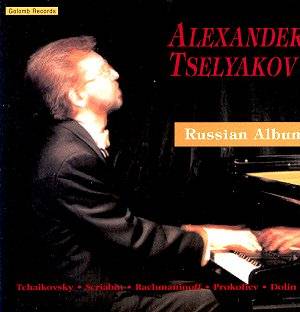What an extraordinarily difficult piece to bring off
the Rachmaninov G major Prelude is. If you just play it as it is, it
can seem dry and unfeeling. Once you start introducing expressive nudges
it starts to fall apart. And a tempo that respects Rachmaninov’s "Moderato"
marking risks throwing the whole thing out of the window.
Tselyakov is more "Andante" than "Moderato"
and there is a slight suspicion in the early stages that he is going
to stop at every lamp-post. But by the recapitulation the performance
has settled down remarkably, the bell-motif tolling inexorably, the
melody singing sweetly and sadly. Better still in the G sharp minor
prelude where, in place of the usual mercurial approach, he opens up
vistas of sadness as far-reaching as the steppes themselves. A comparison
with Richter’s 1960 Carnegie Hall performance (Richter
Rediscovered 09026-63844-2) confirmed that as something altogether
out of the ordinary, with a myriad of special insights crammed into
every bar; but I value Tselyakov too. And I recently had occasion to
remark that Richter threw away the 3rd Etude-Tableau with
little more than nonchalant technical aplomb at Aldeburgh in 1966 (BBCL
4082-6); Craig Sheppard uncovered a wealth of detail here (AT
00-00118; see review for ordering details). Anyone who found Sheppard
too gentle might feel that Tselyakov’s more emphatic but not frenetic
performance is the ideal compromise.
I have started this review in the middle of the record,
but I began here late at night, intended just to sample a couple of
pieces, and I wish to share with my readers the process by which I discovered
a remarkable interpreter of Russian music (maybe of other music too;
a second disc including Beethoven op. 110 is awaiting me. As I write
I am ignorant as to its merits, so watch this space).
Prokofiev’s 5th Sonata is a favourite competition
piece. Perhaps for this very reason it has acquired a reputation for
superficiality, as an easy product of the composer’s bottom drawer.
Here it is played with a calm luminosity of texture; every note shines
and glistens. The work is revealed to be second-string Prokofiev rather
as Mozart’s piano sonatas are second-string Mozart; it is pretty marvellous
even so.
No great revelations emerge from Samuel Dolin’s Toccata
Vivace, heard here in its world première performance some years
after its composition. But Tselyakov’s willingness, after settling in
Canada, to take up the cudgels on behalf of a countryman of his who
had been teaching at Toronto Conservatory for more than half a century,
says much for him as a man and as an artist.
The disc opens with a rare set of variations by Tchaikovsky.
Here doubts arise as to Tselyakov’s response to more classically based
music since the markings in the score are not always scrupulously observed
(assuming the Peters Edition is correct). The earlier variations are
marked to be played at the same tempo as the theme, for example, but
Tselyakov adjusts the tempo between them. He also alters some of the
dynamics in the last variation. On the other hand, if you put aside
the score and just listen he brings it off the page well. It is a tribute
to both Tselyakov’s pianism and Tchaikovsky’s abilities to dress up
his theme inventively that it only occurred to me towards the end that
the actual melody on which the variations are based is a pretty unmemorable
one. It has to be admitted that if Tchaikovsky had written nothing better
than this we would remember him, yes, but in the same breath as Glazunov
or Arensky rather than as a household name.
Tselyakov proves an altogether outstanding interpreter
of Scriabin. He realises the sad songfulness of the more introspective
moments without drifting into the doldrums – the music apparently just
flows out of him. He is equally able to share Scriabin’s moods of extreme
exultation without lapsing into vulgar barnstorming. Having commented
on certain variations between the performance and the score in the Tchaikovsky,
anyone with the music of the op.65/3 étude is recommended to
follow it just to see how an imaginative interpreter can give sense
to notes which, on the written page, may not seem to have much.
The recordings are very fine so all round this makes
a fine recommendation to anyone at all interested in Russian piano music
or Russian pianists. Tselyakov was born in Baku, Azerbaijan, in 1954
and has been living in Toronto since 1994. He made his UK debut at the
Wigmore Hall on 14th April 2002. Golomb Records appear to
be an offshoot of Golomb Concert Management – www.interlog.com/~golomb
– which represents him. They sent the disc to the site together with
a selection of laudatory press cuttings, but I would like to commend
their honesty for enclosing one which struck a less positive note; the
critic noted his "velocity and accuracy" but felt that "one
senses in his playing other worlds that remain to be conquered. Namely,
the ability at times to create a world around the music itself ….. a
lack of atmosphere that often spared the music its ability to compel"
(James Manishen, Wpg. Free Press 17th January 1999). Maybe
Tselyakov was having an off-day, or else the critic was. I deliberately
left perusal of this material till after hearing the disc and as you
will gather my impression was practically the opposite. Indeed, if Tselyakov’s
future recording schedules should embrace extensive investigation of
Scriabin and Prokofiev, I for one very much look forward to hearing
the results.
Christopher Howell


